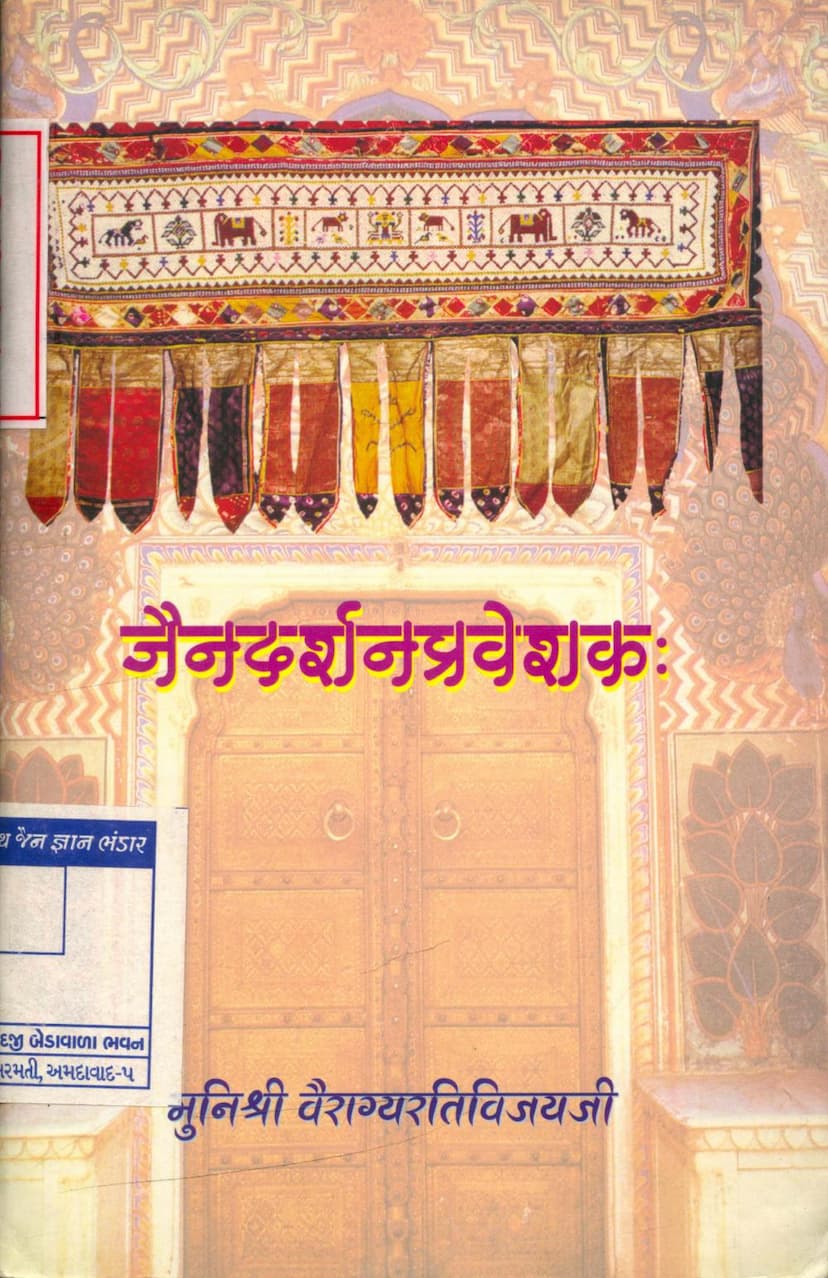Jain Darshan Praveshak
Added to library: September 1, 2025

Summary
Based on the provided pages of the Jain text "Jain Darshan Praveshak" by Muni Vairagyarativijay, here is a comprehensive summary in English:
Book Title: Jain Darshan Praveshak (Introduction to Jain Philosophy) Author: Muni Vairagyarativijay Publisher: Pravachan Prakashan Series: Shri Vijaymahodaysuri Granthamala - 24
Overall Purpose: This book serves as an introductory guide to Jain philosophy, specifically focusing on the core principles of knowledge (pramana) and viewpoints (naya) within Jainism. It aims to provide a foundational understanding for seekers and researchers interested in Jainism. The book compiles key philosophical texts that are considered essential for grasping the essence of Jain thought.
Key Themes and Content:
-
The Nature of Philosophy (Darshan):
- Philosophy is defined as reasoned and evidence-based thought that attempts to understand the underlying order of the universe, which is not visible to the naked eye.
- Key subjects include the soul (atma), the world (jagat), the relationship between them, and the ultimate pure state of the soul.
-
Jainism and Other Philosophies:
- India is home to numerous philosophical systems, each interpreting an aspect of Lord Mahavir's Syadvada (theory of conditioned predication).
- These systems often present contrasting and opposing views.
- Jain philosophy (Anekanta) is presented as a synthesis of all philosophies, implying that studying Jainism is equivalent to studying the fundamental elements of all schools of thought.
-
Methodology of Study:
- The study of any scripture should involve three stages:
- Memorizing the fundamental terms.
- Internalizing the key concepts.
- Contemplating the reasoning within the scripture.
- Memorization is emphasized as a means to stabilize thoughts and facilitate deeper contemplation, citing the tradition of memorizing scriptures and Āgamas.
- The study of any scripture should involve three stages:
-
Compilation of Essential Texts:
- This collection includes "introductory" Jain philosophical texts.
- It comprises works related to the theory of knowledge (pramana) by eminent scholars from Shri Siddhasen Divākarasuri to Upadhyaya Shri Vinayavijayaji.
- The book aims to simplify the etymology and understanding of Jain philosophy by encouraging the memorization of these texts, or at least one of them.
-
Content Breakdown (Based on the Index and sampled text):
-
The book contains a collection of six key texts:
- Nyayāvatāraḥ (Introduction to Logic/Reasoning) by Shri Siddhasena Suri
- Pramānanayatattvālokaha (The Light of Principles of Knowledge and Viewpoints) by Shri Vādideva Suri
- Pramānamīmāṁsā (An Investigation of Knowledge) by Shri Hemachandra Suri
- Sammati Sūtram (The Sutra of Correct Understanding) by Shri Siddhasena Suri (also includes Naya Kanda and Jiva Kanda sections)
- Naya Karṇikā (The Essence of Viewpoints) by Upadhyaya Shri Vinayavijayaji
- Shaḍdarśanasamuccayaḥ (Collection of Six Philosophies) by Shri Haribhadra Suri
- Anyayōgavyavacchedadvātr̥ṁśikā (Thirty-two Verses on the Distinction of Other Paths) by Shri Hemachandra Suri
-
Detailed Content from Sampled Texts:
- Nyāyāvatāraḥ: Discusses the nature of valid knowledge (pramana) as being self-illuminating and free from contradiction. It categorizes pramana into direct (pratyaksha) and indirect (paroksha). It elaborates on the nature of inference (anumana), the constituent parts of a logical argument (paksha, heto, drishtanta), and the fallacies of reasoning.
- Pramānanayatattvālokaha: This is a more extensive philosophical treatise. It delves deeply into the definition of pramana, distinguishing it from mere knowledge and discussing its validity. It meticulously explains the types of pramana: direct (pratyaksha) and indirect (paroksha). Direct knowledge is further divided into empirical (sāmvyavaharika) and transcendental (paramarthika), with detailed descriptions of sensory and non-sensory perception, and the pure forms of knowledge (avadhi, manahparyaya, kevala). Indirect knowledge is categorized into memory, recognition, conjecture (uhā), inference (anumana), and testimony (agama). It also thoroughly analyzes the various forms of fallacious knowledge (pramanābhāsa) and the structure of valid arguments.
- Pramānamīmāṁsā: This work, by the renowned Hemachandra Suri, also focuses on the principles of knowledge. It defines valid knowledge (pramana) as the accurate determination of reality. It categorizes pramana into direct (pratyaksha) and indirect (paroksha), further detailing the types of direct knowledge (kevala, avadhi, manahparyaya) and the modes of empirical perception (avagraha, iha, avaya, dharana). Indirect knowledge is classified into memory, recognition, inference, and testimony. It discusses the role of the soul (pramata) as the knower and the relationship between knowledge (pramana) and its result (phala).
- Sammati Sūtram: This foundational text deals extensively with the theory of 'naya' (viewpoints) and its nuances. It explains the difference between the substantial (dravya) and modal (paryaya) perspectives, highlighting how each can lead to partial or even erroneous conclusions if taken exclusively. It discusses various schools of thought (darshanas) in relation to naya, emphasizing the Jain perspective of anekanta. It also touches upon the soul, karma, liberation, and the nature of right faith, knowledge, and conduct.
- Naya Karṇikā: As an introduction to naya, this work clarifies the classifications and scopes of different naya systems, explaining how they contribute to understanding the multifaceted nature of reality.
- Shaḍdarśanasamuccayaḥ: This text provides a concise overview of six major Indian philosophical systems: Buddhism, Nyaya, Samkhya, Jainism, Vaisheshika, and Mimamsa. It briefly outlines their core doctrines, deities, epistemologies (pramanas), and metaphysical concepts. The section on Jainism highlights its unique teachings, including the nine tattvas (essences), the nature of the soul, karma, and the emphasis on right faith, knowledge, and conduct.
- Anyayōgavyavacchedadvātr̥ṁśikā: This text critically analyzes and refutes the tenets of other philosophical systems that deviate from the correct Jain path, advocating for the supremacy of the Jain doctrine.
-
-
Sponsorship and Publication:
- The publication of this book was made possible through the generous contribution of the Chhangalal Velichand Kothariya family.
- The book is published by Pravachan Prakashan in Pune.
In essence, "Jain Darshan Praveshak" is a scholarly compilation designed to introduce the intricate philosophical landscape of Jainism. It emphasizes the importance of understanding the principles of knowledge (pramana) and the diverse viewpoints (naya) within Jainism to achieve a comprehensive grasp of its teachings, which are presented as a synthesis and resolution of various philosophical debates.